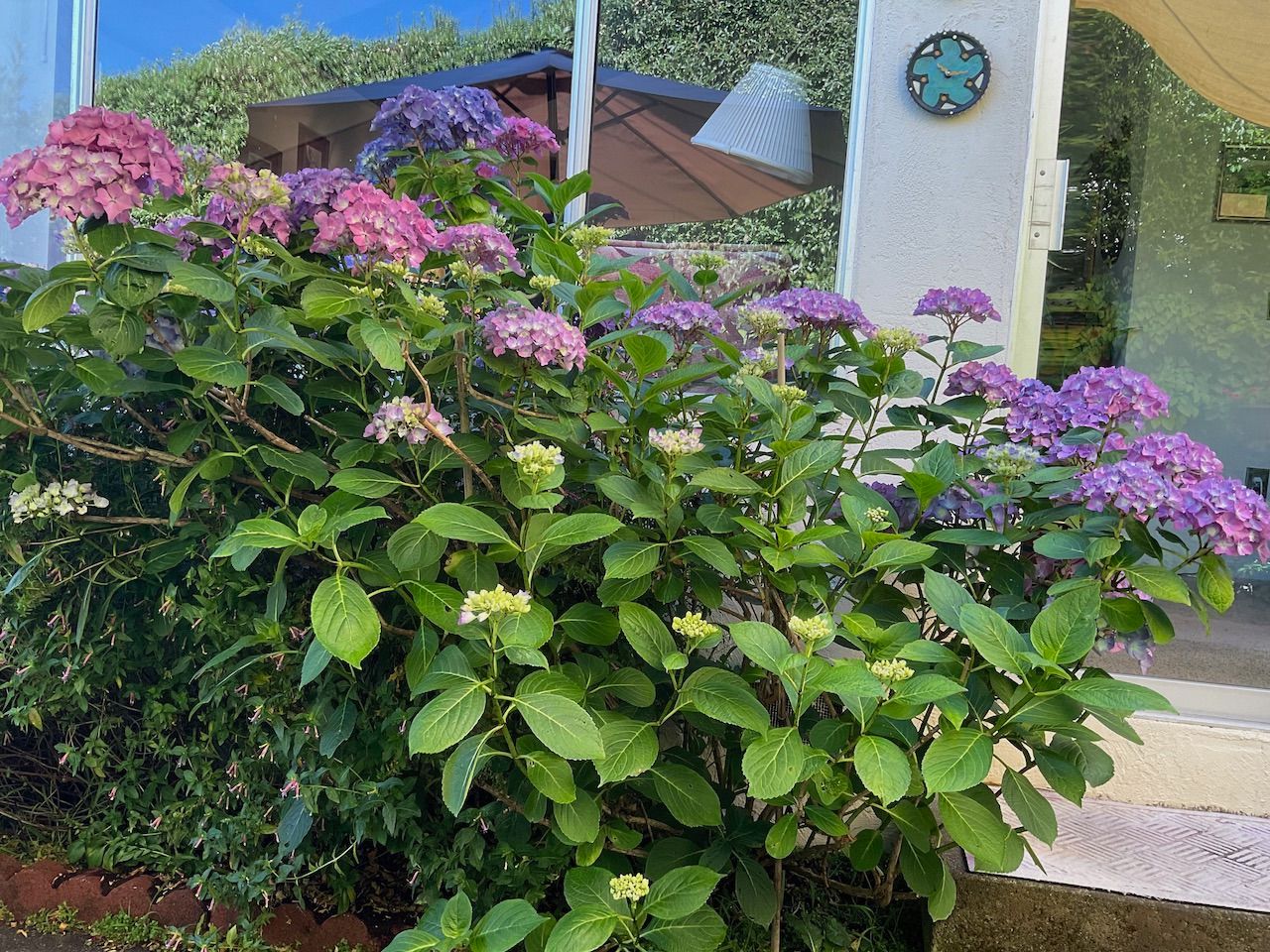Plex: 2 August 2023
Top of Acadia Mountain; Imagination & Groundedness; Let the Mud Settle, Until Clarity Emerges; Where White Folks Can Imagine Ceding Power; Act in Unison; Neighborhood Flowers; To Bee or Not to Bee? SIGGRAPH’s 50th: A Rather Spectacular Gallery; The Serious Logical Structure of the Climate Moment

The Biweekly Plex Dispatch is an inter-community newspaper published by Collective Sense Commons on first and third Wednesdays of each month. Price per issue: 1 USD, or your choice of amount (even zero).
In This Issue
- From the Top of Acadia Mountain (Wendy McLean)
- Imagination & Groundedness (Todd Hoskins)
- Can You Let the Mud Settle, Until Clarity Emerges (Charles Blass)
- Where White Folks Can Imagine Ceding Power (Kevin Jones)
- Act in Unison for the Better Good (Klaus Mager)
- Neighborhood Flowers (Ken Homer)
- To Bee or Not to Bee? (Ken Homer)
- SIGGRAPH’s 50th: A Rather Spectacular Gallery (Julian Gómez)
- The Serious Logical Structure of the Climate Moment (Douglass Carmichael)
From the Top of Acadia Mountain
by Wendy McLean
Ed. note–Wendy is readying a post for a future edition of the Plex. In the meantime, she forwards us this lovely photo.

Imagination & Groundedness
Text and photos by Todd Hoskins
I’m taking a break from writing on being a respectful digital nomad. I’ll pick that up later this month.
We seem to live in a time of great ideas, but little idea of what to do next.
There was a time when I called myself a possibilitarian. I loved putting my imagination to work on music, film, writing, coaching, relationships, doing vision work with organizations and communities. It is enlivening to be in the space of creation, and I thrived within it. I still do, but it’s no longer enough to dream, to scheme, to imagine what is possible.
We desperately need imagination. There is no healed relationship with our planet, let alone a well-lived life without the capacity to imagine. In the circles of people where I intersect, there is no lack of ideas, theories, and proposals. Possibilities are abundant. Dreaming, whether it’s for a business, policy, or framework, surrounds me.
So what is the relationship between imagination and groundedness? I asked myself that question for the first time yesterday as I struggled with two projects where people in leadership love dwelling in the realm of possibility. They seem to be riding a wave of excitement with what could happen, followed by a crash of disappointment that nothing is really happening.
Transformation requires imagination. But when that imagination is not grounded, what good is it? And what do I mean by grounding?
Let’s try this . . . To be grounded is to know through the senses, to sense a wise next step, and to be connected to the dynamic, living world rather than just one’s thoughts. Imagination shows us the possibilities, but groundedness offers paths to get there.
I didn’t really understand groundedness, being a disembodied possibilitarian. More than a decade ago in a leadership training program, I was taught to ask for consent to hold people’s feet if you sensed they were “floating.” I thought that was interesting. Then during one session I saw a colleague crawling towards my feet. I nodded with surprise. “Oh. I guess I float sometimes.”
What do we do with all of us floaters? For me, time in Nature started to show me what groundedness could be like. Yoga may help. Breathing exercises. Cooking. Gardening. Sex. But what do I do with the leadership teams that float together?
I’m not sure, but I’m thinking about starting the day with a hike.
Can You Let the Mud Settle, Until Clarity Emerges
by Charles Blass
required listening for our community.
arguably daniel schmachtenberger’s most efficient distillation, from a few weeks ago:
Ed. note, the title, Can You Let the Mud Settle, Until Clarity Emerges, comes from the end of Schmachtenberger’s discussion.
And now, we ask for a little forbearance and intelligence from Plex readers. Charles’ statement above is simple, declarative, and obvious. Watch the video!
And, Pete is working with GPT-4 on experimental summarization of longer transcripts, and for this edition of the Plex, asked about the video above, “Write a short summary of [the transcript of this video] that would help me understand what this talk was about, and would help me know if I want to listen to the whole thing.”
The following, written by GPT-4 after examining the transcript, is not a replacement for listening to the talk; but rather, is intended to be another tool to help you to choose to listen with your human eyes, ears, and brain.
This talk explores the intersections of socio-economic systems, capital, and technology, advocating for their reformation towards sustainability. The speaker critically examines the destructive impacts of our current systems, especially the treatment of nature as a commodity for unending profit. They propose holistic and ecosystem-based thinking to replace the continuous growth mindset. Additionally, they provide advice for impact investors, emphasizing the need for self-sustaining systems and closed-loop technologies. Challenging prevailing narratives of progress and innovation, the speaker encourages a deeper, more holistic understanding of value. The talk concludes with a call to align with nature, value deep insights, and collaborate for natural stewardship. This talk could interest those engaged in socio-economic structures, sustainable investment, technology, and environmental stewardship.

Where White Folks Can Imagine Ceding Power
by Kevin Jones
We are in the early stages of convening some indigenous groups, for them to set the terms of trade for investments on Indian businesses reflecting native values. Such as, they don’t like exits; if something works, stick with it.
There is a flood of money coming their way–Biden money with a deadline and a focus on natives, so they are in a unique and probably not permanent position of market power. It’s early and it might not work, but any progress on setting a standard will be a win.
The easiest place for settlers to invest is into things that showcase the narrative of indigenous landscape management as the most resilient path to respond to climate change. It’s a place where white folks can imagine ceding power.
Act in Unison for the Better Good
by Klaus Mager
I’m listening to Scott Galloway:
He has some solid insights that to most here are familiar themes. But at the core of it, look at the topics we have been discussing / sharing. They are all about defining the problem is ever so many ways. But truly, don’t we know and understand what is the issue by now?
I love the thought process of Scott Galloway because he is trying to figure out what can drive us forward, how could we align and coordinate our actions? What would we need to know to move forward and act in unison for the better good?
Then I asked my ChatGPT 3.5 to write a poem for us wandering in the wilderness of thoughts:
In the shadows of despair, we stand,
Witnessing a world slipping through our hands,
A climate shifting, a planet in pain,
Yet we find ourselves paralyzed, unable to gain.
In streams of data, we drown and wade,
Endless knowledge, an ocean cascade,
How bad things are, we know too well,
But action eludes us, as if under a spell.
With trembling hearts, we watch the signs,
The storms, the fires, the warming climes,
But overwhelmed, we hesitate to act,
Not knowing where to start, courage we lack.
Yet deep within, a flicker resides,
A glimmer of hope that somehow abides,
For talent, skills, and connections await,
To rise above helplessness and change our fate.
The time is now, the call rings clear,
To protect our communities, to hold them dear,
With unity, we’ll rise, our spirits high,
Mitigate, adapt, and not let hope die.
Let’s weave a tapestry of dreams and plans,
Crafted together, hand in hand,
In every heart, a fire will burn,
To heal the wounds, the scars to turn.
Engage the minds, ignite the will,
For Mother Earth, we must fulfill,
A duty bound, a promise made,
To leave a legacy that won’t fade.
Let’s plant the seeds of hope and care,
Nurture the earth with love and prayer,
Embrace the challenge, stand tall, and strong,
For together, we shall right this wrong.
No longer bound by helplessness’s shroud,
We’ll rise above, our voices loud,
For a future where life can thrive,
With hope, determination, we will survive.
What comes to my mind is “Time for Outrage: Indignez-vous!,” a book by 93-old Stéphane Hessel–a Resistance leader, concentration camp survivor, and former UN speechwriter.
Hessel reminds us that life and liberty must still be fought for. He urges us to reclaim those essential rights we have allowed our governments to diminish since the end of World War II.
In a parallel sense, watching the ongoing changes and deteriorations in our biosphere, it is clear that we are running out of time to act.
The urgency could not be more pronounced.
Neighborhood Flowers
by Ken Homer




To Bee or Not to Bee?
Thoughts on the loss of tiny lives
Text and photos by Ken Homer

When I moved into this apartment back in Dec of 2012, the patio was almost devoid of plant life. There were a couple of jasmine plants against the fence and three mature Japanese Maple trees – sadly lost two years ago to the rebuilding of a retaining wall. Surrounding the concrete of the patio was a ribbon of hardpacked soil with a high clay content. In Spring of 2013, I spent many hours and endured many blisters as I broke up that soil and added amendments and moisture control soil so that I could plant a garden. While I would like to have a vegetable garden it’s not really practical here. For one thing the patio borders driveways at either end and I don’t think the soil would be healthy for growing edible plants. There was also a huge amount of English ivy on the retaining wall that played home to a mischief of rats, and they always managed to “harvest” whatever edible plants I grew in pots before I did.
So, I settled on growing ornamental plants. Over the years, I’ve invested in plants that are attractive to bees and hummingbirds. One bush in particular that I planted about seven years ago plays host to a swarm of diligent honeybees who spend their days sipping at the flowers. There’s also a squadron of mighty black carpenter bees, whose loud rumbling buzz makes me think of them as Bee-52s. Many guests have been disturbed to sit next to that bush due to the constant drone of busy bees, but both honeybees and carpenter bees are docile, and no one has ever been stung by sitting near it.
This summer I am shocked and dismayed to note that there’s been a dramatic reduction in my sweet honeybee visitors. I’ve yet to see a single honeybee on the bush that, during previous summers, was swarmed from dawn to dusk. Occasionally I spot a lone black carpenter bee hovering over one of my hydrangeas, but I have not seen any honeybees visiting my garden, save the heartbreaking sight of a disoriented honeybee crawling in circles on the concrete for half an hour before it laid still on the ground. It was mostly likely a victim of collecting pollen from plants that have been treated with neonicotinoid pesticides, which have been shown to disrupt the nervous systems of bees resulting in a staggering collapse of bee populations around the world. For the record, I only buy ornamentals from nurseries that do not sell neonicotinoid treated plants.
If we lose honeybees, the economic cost will run to the trillions of dollars as they pollinate some of our most popular crops such as: apples, almonds, watermelons, strawberries, blueberries, tomatoes, cherries, avocados, onions, pumpkins, and numerous other vegetables. Imagine life without these foods!

But it’s not the economic cost that is bothering me today. It’s the sadness I feel at watching these amazing creatures disappear before my eyes. Each time I see a dead honeybee my soul aches. Each death is a painful reminder that the mass extinction event now underway is much closer to home than I care to admit. Each of these tiny deaths is a sure sign that the way as us-humans currently operate in the world is literally killing nature and, as anyone reading this knows, us-humans are nature. How long until we start to see the signs of human colony collapse? Maybe the signs are already there and we’re ignoring them? There’s an old saying that the dosage makes the poison. How many more billions of tons of toxins can we release into the biosphere before we too are crawling around in circles only to eventually lay still against the Earth?
SIGGRAPH’s 50th: A Rather Spectacular Gallery
by Julian Gómez
This year is the 50th SIGGRAPH conference, and over the last year there’s been quite a lot of activity in finding artifacts covering that 50 year history, which will be displayed at the conference.
Part of the exhibition will be a timeline with 3D graphics projected on a 20’×50’ wall showing accomplishments over each of those years in different categories.
Being an old fart who’s been around for almost all of those years I've been contributing quite a bit to the multiple history efforts. It looks like it's going to be a rather spectacular gallery.
As of now there’s one publicly accessible journal:
The Big 50: Celebrating 50 ACM SIGGRAPH Conferences (PDF, 22.6Mb)
Con: The exhibition is behind an old-fashioned paywall, i.e. you need a ticket to see it.
Pro: There’s been some talk about touring the exhibition. Most likely this won’t be seriously addressed until after the resting period after the conference.

The Serious Logical Structure of the Climate Moment
by Douglass Carmichael
These are an integrated series of postings from douglasscarmichael.substack.com. The number is the number of postings in the original blog and the date is the date published. I have included only recent ones, ones with more about climate strategy.
The Serious Logical Structure of the Climate Moment
# 3006 July 13 23
This week, the world is filled with proposals that seem nonsensical, suggesting that with action, the climate crisis will be “solved.”
The logic of possible futures is tightening. I highly recommend that you try to place your own viewpoints into a compact logical structure and observe the outcomes.
We can’t halt temperature rises because we can’t stop CO2 production. Every new project or green initiative adds to the industrial system and consumes energy (in the US, 17% of electrical energy goes towards computing).
Even if we ceased all CO2 production, the existing amount in the atmosphere would continue to heat the air. It isn’t decreasing except for a small fraction each year, due to its 120-year half-life.
The cost of green energy is often considered “at the pump”, but the expenses of building and installing are usually overlooked. We consider the cost of running a Tesla but not the cost of manufacturing it (including the cost of building the factory), nor the cost of the energy lines to deliver power from the utility company. Worse still, the electricity produced requires energy to create, which is usually sourced from coal.
Currently, wind and solar production worldwide account for three percent of total energy. This is a shaky foundation on which to build successful scenarios of technological solutions at or near 100%.
Even if we could eliminate all new emissions, enough CO2 is already in the air to keep temperatures rising, absent any large-scale carbon sequestration technologies, which do not yet exist.
We often fail to consider the loss of species necessary for food production, or the impact on the oceans. We overlook the inability of governance to intervene effectively.
There is a growing sense that capitalism fosters socially destructive inequality, and that a society dividing people between owners and non-owners, labor and capital, is part of the problem. However, we don’t have an alternative yet. Capitalism aims to extract wealth from land and people by buying cheap–trees, for instance–and selling high–lumber, without full replenishment.
The existing fossil fuel energy system will collapse either due to a lack of materials for projects or escalating costs as extraction intensifies and inflation rises.
Attempting to procure these materials in sufficient quantities leads to extensive land abuse and sets up competition for the same resources (20 pounds of lithium requires processing 20 tons of earth).
There isn’t enough of certain required metals in the ground to meet the needs of one generation of EVs, let alone cater to the replacement cycle that will soon begin for the oldest EVs.
Recycling isn’t a frictionless system–it requires energy. Pushing material through the system isn’t easy, and there are many competing uses of electrification, all seeking the same materials.
Competition for scarce resources among nations and corporations will occur within the context of increasingly severe climate events.
The conflict in Ukraine is not an internal cultural war, but one between cultures. Both Russia and the US/EU seek cultural dominance. The US advocates for a market-based world, while Russia leans towards a czarist world. There appears to be no end in sight for this war, which will continue to escalate, increasing the use of resources, energy, and the production of CO2.
Our society seems to be growing ever more complex, intertwined, and resistant to change. Under the strain of climate symptoms, people try to cling to what they have and resist change.
Climate breakdown is inevitable, but it isn’t a single event. It is a process with many emergent possibilities, not just market and commercial opportunities, but deep cultural shifts in values and how we allocate our time.
The current older population, those aged 50 and above, perhaps even 40 and above, is generally too entrenched in its ways to adapt to these changes. For instance, they may view emergent opportunities as private property and profit chances, missing out on the challenging tasks of adapting to new social and climate changes. Most people prefer to cling to what they have rather than embrace change.
Emergent changes already in process are likely to be characterized by chaos, confusion, and potentially violence, ranging from mafia activities to conventional war.
Potential game changers include new uses of the Internet, new energy technologies, and new spiritual movements.
Global problems likely need global solutions and a central authority capable of imposing regulations. The American New Deal is an example of strong ideas from Roosevelt, but with rather weak implementation by Congress and the press.
This is our world, and we are its inhabitants. Our responsibility is to read widely, engage in broad conversations, and organize.
“We are at the very beginning of time for the human race. It is not unreasonable that we grapple with problems. But there are tens of thousands of years in the future. Our responsibility is to do what we can, learn what we can, improve the solutions, and pass them on.” — Richard Feynman
References:
Simon Michaux’s discussions on minerals (YouTube search)
Mark Mills, The energy transition delusion: inescapable mineral realities (YouTube)
Nate Hagens, The Great Simplification
Daniel Schmachtenberger, Civilization Emerging
Martin Wolf’s ‘The Crisis of Democratic Capitalism’ (Penguin Random House)
Interview with Martin Wolf and Rob Johnson (Institute for
New Economic Thinking)
Digital Society and Social Transformation
# 3007
The increasing discourse surrounding social and economic transformation invariably poses the question–transformation towards what? Perhaps a digital world might be more conducive to social experimentation than the object-focused, materialistic world we are transitioning away from.
Influential narratives, often referred to as scenarios, provide clues for how to proceed with crucial issues concerning organizations or societies, and as issues emerge, they also provide strategies.
However, constructing dynamic narratives about our past and probable future often faces obstacles. The difficulty lies mainly in the fact that professionals, especially in the tech industry, are limited by the notion that history simply involves the transition from agriculture and rural life to factories and cities.
This perception of the movement from rural to industrial society offers a limited view of humanity’s history on Earth. People tend to avoid reading about climate, war, inequality, soil quality, and loss of species, not to mention the lack of exposure to news about their own and comparable life circumstances, such as polluted communities or streets that resemble prisons.
Understanding the causes of these negative outcomes is impossible if their effects aren’t clearly experienced.
Certainly, there are more complex narratives, albeit understood by only a few. These narratives detail our transition from hunter-gatherers, to herding, to settlement formation, craftsmanship, factories, cities, banks, and finally, to a larger tech focus.
However, these narratives often omit the story of capitalism, inequality, religions, elites, and ideas outside one’s own specialized silo.
Graeber and Wengrow’s ‘The Dawn of Everything’ effectively unravels these largely ignored aspects of history, thereby considering realistic alternatives.
An intriguing idea emerged from a small working group of economists discussing narratives: What if the three phases–agricultural, industrial, and digital–provide a good map of our most relevant history?
This perspective could shift the global conversations about the goals and processes of transitioning out of materialistic and exploitative capitalism towards more humane values. While this has traditionally been a fairly abstract concept and seemingly unreachable, the digital revolution is already here, making a profound impact. It is much easier to transition to something that is already present, albeit weakly.
In digital culture, the flow of electrons replaces the static placement of things. Aliveness replaces deadness. Metaphorically, electrons are more democratic than objects–they are equal agents. This perspective supports the intuitive belief that life is alive, dematerializing matter, and replacing a world of objects with flows, fields, and networks.
So, how do we transition from a universe perceived as matter and objects to a universe experienced as flows, fields, and networks?
We pursue these ideas with the aim of rethinking the kind of society that might emerge based on the long-held goal of creating a more human society. The digital universe is already here, particularly resonating with young minds. These days, the mind is more intuitively perceived as a process than a thing. It’s critical that we leverage this shift and rethink economic and social transformation with compelling ideas that are active in the world, more alive with flows than dead with objects.
The progression from agriculture to industrialization to digital forms an intuitive path that presents numerous opportunities, and with hard work and creativity, the potential to create a better world.
The Internet Is Becoming More Significant Than the Nation-State for Governance, Enabling Transition
# 3008
I have been advancing the idea that we are transitioning from an industrial to a digital culture. This shift is profound, impactful, and cultural. It further allows a transition at the level of governance, institutions, and values. Many young people prioritize internet connectivity over the quality of their living spaces.
The rising frequency and awe-inducing climate news lead to a shift in society’s reliance on the internet. People turn more frequently and with greater focus to the internet for the most relevant, timely understanding of what is happening both locally and globally. Meanwhile, the world’s nation-state organization receives less attention. The outcome is that the internet is supplanting the nation-state with its bureaucratic and parliamentary systems as the source of policy and implementation.
At its best, this could transition to Gardenworlds where food and people are nurtured together in appealing places. At its worst, it could lead to violent struggles over resource allocation.
Events will present us with opportunities we lack the leverage to manufacture.
What to do with the remaining time?
# 3009 JUL 28, 2023
If we are convinced that nothing can halt rising temperatures and catastrophic warming, what should we do? It’s clear that if the temperature rises, all systems will be affected. Each of us has some connection with some of these systems. Consider the effort to defeat Donald Trump. This activity should continue because if he wins, even temporarily, the world we inhabit will be significantly worse. Just as a pianist needs all their fingers, society requires the continuity of most existing efforts to function.
This suggests that we need to continue what we are already doing but do it better, make it more appealing, use less energy if possible, but keep the ship afloat as long as we can. If you feel pressure from the community to cease what you’re doing, it’s best to pay attention. This especially applies to oil company executives. Be mindful of those affected by your actions. Comply with the efforts by the emerging “system” to manage your activities. This is an area where society is exhibiting creativity. There will be many mistakes. Try to be supportive.
It Takes More to Do the Same
# 3010 JUL 28, 2023
From the Guardian
“Extreme temperatures in parts of the US and around the world are forcing airlines to reduce fuel loads, shed passengers or baggage, or wait for daytime temperatures to drop in the evenings, to fly some aircraft.”
The implication is that merely keeping up with what we have been doing requires more effort, energy, and time. This will lead to frustration and exhaustion. We will need increased tolerance as people struggle to cope.
What Story to Tell About Climate?
# 3011 JUL 28, 2023
An important issue is whether we should tell the story of our climate future as we see it, or exaggerate it for self-aggrandizement or to scare others into action. Or should we focus on positive lines of action to encourage participation? Those more negatively inclined cite the observation that many people latch onto positive paths just to say, “See, it's all going to be alright,” and then take no action. We need the philosophers, poets, novelists, and historians to guide us. But where are they? As it stands, both the optimists and the pessimists are essentially being accused of acting in bad faith, which is demoralizing on both sides. It may be that both negative and positive views are de-motivating.
Psychology can offer insights about what motivates people to work harder, but conversations about climate are difficult because we genuinely don’t know what is possible. Strong skepticism from many (I doubt the 100% certainty mentioned above) has fostered the belief that we cannot prevail. Part of their argument is, “But how many resources would it take, who mines the iron and high-grade silicon now needed and what about transportation costs?” We’re short on good answers, and so it goes, with example after example of plans that are not vetted for cost, scale, or CO2 production in manufacturing.
Talk About Climate? Why?
# 3012 JUL 29, 2023
What is the argument for keeping silent about the climate? Conversely, what is the argument for discussing it?
In this series of posts, which I began at the end of May, I aim to be as strategic as possible. However, that term is already vague. What is deemed “strategic” in a solar panel corporation and in the government accountability office can be vastly different. Where we situate ourselves heavily influences what “strategic” will mean. I am writing to support as yet unvoiced thoughts of your own. This is all delightfully complex. Meanwhile, actual suffering in the world is escalating rapidly.
The pressure is on us to be clear.
Thank you for reading! The next edition will be published on 16 August 2023. Email Pete with suggested submissions.
Grateful appreciation and many thanks to Charles Blass, Douglass Carmichael, Julian Gómez, Ken Homer, Todd Hoskins, Kevin Jones, Klaus Mager, and Wendy McLean for their kind contributions to this issue.